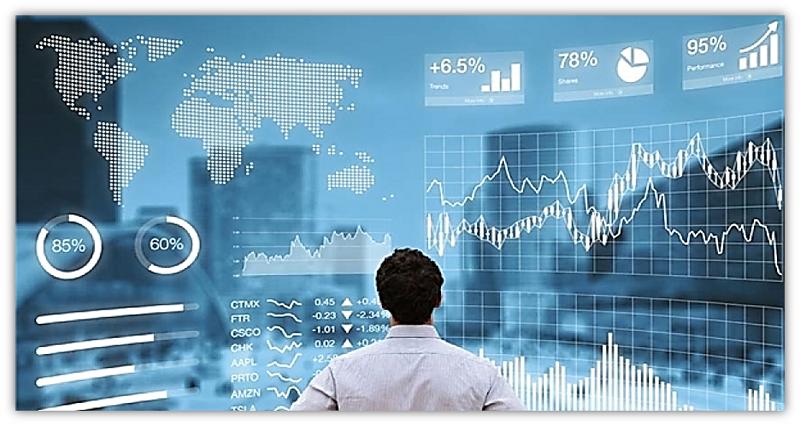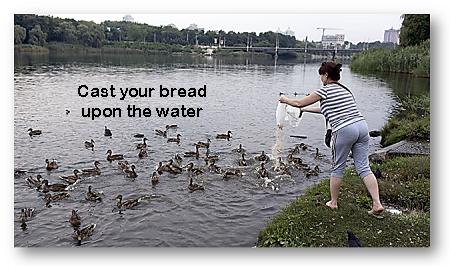Ecclesiastes 11 - Living with Risks
Ecclesiastes 11 - Living with Risks

Across the world enormous risks have been taken. Billions of dollars evaporated within just a few days. Panic at the stock exchanges was the result. Panic in human lives too?
Stupid?⤒🔗
Much is uncertain in our time. Besides uncertainties in society there are financial and economical uncertainties. Ours is not a protected economy, but an open economy. All kinds of material setbacks from all over the world can have repercussions for us. So can you still begin something new, start a business or participate in one?
Aren’t you taking an irresponsible risk?
I once spoke with someone whose business had gone bankrupt. He felt extremely guilty. “Should I have set up that enterprise? Was I stupid? Now I have lost all that money!”
There can be no doubt that in these times many people have lost money on the quiet. This can cause problems, also relational, because of reproaches you receive. “How could you have been so stupid?!”
Cast your Bread...←⤒🔗
First of all, let us not get too wound up. There is no such thing as life without risks. We all have to work in order to provide for our livelihood, but there is no guarantee that all that toil will pay off. We must plant, but depend on the weather for the harvest. We step in our cars, but never know what accident may befall us on the road. At a certain age our children travel to school alone. You sometimes fear the worst, but have to let them go. You can’t hold their hand forever.
There are many more examples. There is no true certainty but God. All else can collapse and disappoint. Yet you must live and set about your work.
In the Book of Ecclesiastes the Preacher, in all his wisdom, writes that one will never plant if one is always watching the wind. And one will not dare reap if one is always watching the clouds. We do not know the paths of the wind, nor do we know the child that is formed in the mother’s womb. In the same way we cannot understand the works of God the Maker of all things (Eccl. 11).
The message here is: look up to God as the beginning of all (also economic) wisdom.
The world is harsh and many plans fail. People deceive each other, or at least choose to their own advantage. When it becomes tricky, it is every man for himself.
Disasters strike the earth. Yet God is present in this world. In the midst of the tumult of the peoples stands the cross of Jesus with its meaning. He paid, He bears, He sustains, He reigns. Summer and winter, rain and drought, day and night are maintained by Him, according to the covenant with Noah and all creatures.
Work, and while you work, look to Him. ‘Cast your bread upon the water’, says the same Preacher. Don’t eat everything, but invest too, in shipping, or trade, in an enterprise, in your work. But spread the bread around; don’t put it all on one ship, for you never know what will succeed and what will not. Beautiful wisdom! Be sensible, spread the risks, but dare to take part! Don’t just sit in a corner. Don’t let yourself be ruled by fear. Be careful, but stay active. Not everything will succeed, you will suffer setbacks. You can’t control it all. But God does not make a mistake in giving us our life here and now. He will keep the world live-able. He has it all under control, for the sake of us, humans. His promises will be fulfilled, one way or another. On that score He does not depend on our success or achievements. And in that belief, neither do we. We deal with this world in the realisation that it is passing away.

That is possible, we are en route, we must not set our goals for here and now too high.
Appreciating your Daily Bread←⤒🔗
And yet that is exactly our pitfall: setting our goals for here and now too high!
Western man wants to have it all, and have it now. Suppliers and financiers massively rise to that call. One wants to sell you all sorts of things, the other is eager to pay it for you. Until you are caught in the vice of payments and, at the slightest setback, cannot fulfil your obligations.
That is one of the primary causes of the financial mess in the Unites States. According to statistics of some months ago, there is an average debt of $ 9.000 – per head of population. These statistics refer to consumer credits. Furthermore, mortgages kept rising, in expectation that the value of property would increase. All that money was also already spent in advance. I ask you! Why do banks do that? Why do they go to such extremes in providing risky finances? The answer is, extra risky loans generate extra interest amounts. That’s makes a nice profit! As long as it lasts. People like buying shares in such banks because their value increases more quickly. And so it became one big knot, difficult to unravel, driven by greed. Not that we are much better here at our end of the great ocean. They say the economy here can take a beating. But here too, it is common practice to cash in on the surplus value of your house and to use it for something nice. Who determines what the surplus value is? For how long? House prices have gone through the sky. Can the same not happen here as in America? I am no economist, but the Bible tells me not to concern myself with great matters or things that are too wonderful for me (Psalm 131).
That is to say: do not seek happiness outside of the borders of what you have!
We were taught to pray for our daily bread. That is bread for today. Whoever asks that of the Lord, implicitly promises to be thankful and content (!) when he receives it. We do not ask for bread for tomorrow. That implies that we are not supposed to use up tomorrow’s bread today. And that is precisely what happens with consumer credits. People are given an opportunity to spend money they have yet to earn. And take note, this happens in a world filled with disappointments and failures, in which even one’s health is a fragile possession. The per capita consumer debt in our (Dutch) population is probably not that low either. People and banks will go to the utmost, until your head is filled with material pride or hopelessness. This is when the Preacher comes to you, in the name of the Lord. Whom do you allow to rule your life? Do not let fear rule your life, is the first approach. But do not let material goods rule you either, for this is all vanity, it is passing. There are days during which you can build, but days will come when you must destroy. You do not know when, you do not know how much, don’t let this rule your life!
Casting your bread upon the water is investing with the intention that the end-result will at least be of equal value. This is not bread you eat. However, consumer credits – the name says it already – are not investments that keep their value. It is a way to consume what you have not yet earned and what God has not yet given. You receive your daily bread for 2012 in 2012, to give just one example, not now. If you eat that bread now, you should not be surprised when all of a sudden there is no bread. Moreover, how will you pray? How can you still say to God that you are thankful and content with what you have been given for today?
Sharing your Bread←⤒🔗
Another risk is that others encounter problems because of our behaviour. If we consume so much, there is little to share with the poor. People who have taken too great risks, will have to cut back their spending drastically. Only that which is absolutely necessary can still be paid. Gifts are one of the first items one will save on. Too bad. Yes, it is too bad, is very bad! For your “possessions” were never just yours, it was also given to let God’s love circulate in the care for the neighbour. Every day we see how great the need is in the world. Aid is needed, aid is also good. God gives so that people need each other.

However, those who allow themselves to be ruled by greed are only concerned with themselves. They only have one way of calculating: what do I get out of it. This will only become worse when they begin to feel the pinch of sky-high loans. Third parties who depend on you become the victim. This is injustice. Mercy is not a luxury, it is the constitution of God’s kingdom.
Never in Vain←⤒🔗
Whether one did right or wrong cannot simply be deduced from the result. Though one must use one’s brains, it is primarily a matter of the heart. Why are you focused on the things you undertake? Why do you take the risks you take?
It helps if you take these things to the Lord in prayer. It is good to acknowledge Him in all your ways (Proverbs 3:6). This will be a continual test: are you pure in your motives? Can you talk with the Lord about your plans, or would you rather He not know about them? Do you want to depend on the Lord in everything, and serve Him with the results? It will certainly do no harm to promise that on forehand.
If you do that, you will notice that a hunger for success will be strongly relativized. For the Lord gives more than you could ever earn or achieve. This is the framework in which you should work... And you will notice that a pure heart is more important than all other things. Most important is standing before God with a clear conscience, in prosperity and adversity.
And next in importance is believing that all your labour, however difficult, is never in vain in the Lord. 1 Corinthians 15:59 promises this literally. Attempts to do a good work can be without effect in this world, people can ridicule you or make accusations. But the Lord will never forget if you dedicate all things to His hand. He will remember that in this world filled with risks you dared to be undertaking, that you listened to Him who encourages you to dare to exist. For the Lord does not count the results in your bank account, but in your heart.

Add new comment